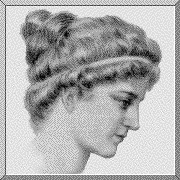 Hypatia
, the daughter of Theon of Alexandria, was born in about 370 AD. she
is the earliest woman scientist whose works have been documented. As
a young woman, she traveled to Athens and Italy. Upon her return to
Alexandria, she became a philosopher and mathematician. She was
appointed to expound the doctrines of Plato and Aristotle and was a
noted lecturer on the subjects of mathematics, astronomy, philosophy,
and mechanics.
Hypatia
, the daughter of Theon of Alexandria, was born in about 370 AD. she
is the earliest woman scientist whose works have been documented. As
a young woman, she traveled to Athens and Italy. Upon her return to
Alexandria, she became a philosopher and mathematician. She was
appointed to expound the doctrines of Plato and Aristotle and was a
noted lecturer on the subjects of mathematics, astronomy, philosophy,
and mechanics.
Most of her writings dealt with mathematics, especially algebra. Her most noted work, called Arithmetica, was a commentary on the writings of Diophantus. Hypatia also wrote an explanation of the geometry works of Apollonius of Perga, which was titled, On the Conics of Apollonius. Later in her career she worked with Theon and coauthored a work on Euclid's geometry which is titled Elements.
In addition to her mathematical works, Hypatia also developed an apparatus for distilling water, an instrument for measuring the level of water, a plane astrolabe (for measuring the positions of the stars, planets, and sun) and a graduated brass hydrometer for determining the specific gravity of a liquid. Hypatia's philosophical beliefs were in conflict with the views of the Christian rulers of the city of Alexandria. When Cyril, a fanatical Christian, became Partiarch of Alexadria in 412 AD he began a persecution of scholars in the city. In 415 AD Hypatia was arrested, tortured and killed in the church called Caesarium.
References
Alic, M. (1986). Hypatia's Heritage: A History of Women in Science from Antiquity to the Nineteenth Century. London: Women's Press Ltd.
Daintith, J., Mitchell, S., & Tootill, E. (1981). A Biographical Encyclopedia of Scientists. New York: Facts on File.